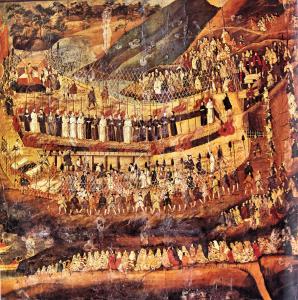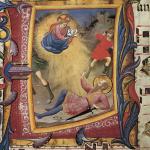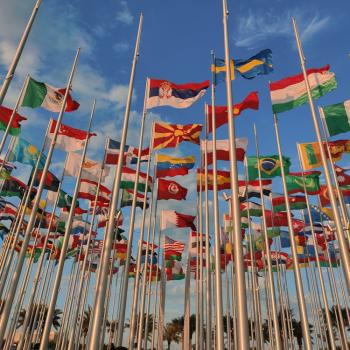 Throughout Christian history, Christians have had to deal with nationalistic xenophobia. Christianity embraces universality over exclusivity. It breaks down any nationalistic division as it says all of humanity, indeed, the whole of creation, is to become one in Jesus Christ. “There is neither Jew nor Greek, there is neither slave nor free, there is neither male nor female; for you are all one in Christ Jesus” (Gal. 3:28 RSV).
Throughout Christian history, Christians have had to deal with nationalistic xenophobia. Christianity embraces universality over exclusivity. It breaks down any nationalistic division as it says all of humanity, indeed, the whole of creation, is to become one in Jesus Christ. “There is neither Jew nor Greek, there is neither slave nor free, there is neither male nor female; for you are all one in Christ Jesus” (Gal. 3:28 RSV).
Christians, in their missionary activity, went around the world, often finding themselves not only unwelcome, but locked up, tortured, and often executed, because they were foreigners who threatened social mores. They experienced the brutal backlash which authoritarian nationalism gives to all foreigners, being told their presence in their new land was itself illegal. Treated as criminals, they had no rights. They were tortured and executed, with their deaths used as warnings to others, trying to make sure no other Christians came into lands in which they were not wanted.
According to tradition, the Apostle Thomas was martyred in Mylapore, India (circa 72 CE). In the legendary Consummation of Thomas the Apostle, we are told that he was locked up and killed because he was seen as an outsider undermining civil society:
And Misdeus said to him: Are you a slave, or a freeman? And Thomas answered and said to him: I am not a slave, and you have no power against me at all. And how, said Misdeus, have you run away and come to this country? And Thomas said: I came here that I might save many, and that I might by your hands depart from this body. Misdeus says to him: Who is your master? And what is his name? And of what country, and of whom is he? My Lord, says Thomas, is my Master and yours, being the Lord of heaven and earth. And Misdeus said: What is he called? And Thomas said: You cannot know His true name at this time; but I tell you the name that has been given Him for a season—Jesus the Christ. And Misdeus said: I have not been in a hurry to destroy you, but have restrained myself; but you have made a display of works, so that your sorceries have been heard of in all the country. But now this will I do, that your sorceries may also perish with you, that our nation may be purified from them. And Thomas said: Do you call these things which will follow me sorceries? They shall never be removed from the people here.[1]
St. Thomas was called a sorcerer, someone who used black magic to manipulate and harm Misdeus’s people. He was executed as a criminal, the common excuse given by tyrannical leaders of states which abuse and degrade foreigners. St. Thomas was a lawbreaker because he violated the political-religious order, threatening to overturn it through his proclamation of Christ. He had come into Mylapore as an illegal alien, and instead of following the law dictated to him by Misdeus, Thomas obeyed the greater, more universal law, the law of God. He did not believe he had to follow the law established by the state when it violated the higher law following a principle which would later be described as “an unjust law is no law.” Positive law holds no power when it violates the common good.
What happened to St. Thomas happened to many other of the early Christian Apostles and Evangelists when they went on missions. They were executed for violations of the positive law because they held such law held no authority over them. Artificial boundaries between nations were ignored by them as they went throughout the known world preaching the Gospel of Christ.
The Christian faith spread throughout the world. In Rome, Christianity was an illegal religion, and those who were Christians, or those who housed and protected Christians, were often tortured and executed. The first British martyr, St. Alban, was originally a pagan who welcomed and protected a Christian priest in his home. He broke Roman law by giving refuge to a Christian. As a result, he himself was to become a Christian in faith and willingly die a martyr’s death for Christ, receiving his baptism through blood:
When these unbelieving Emperors were issuing savage edicts against all Christians, Alban, as yet a pagan, gave shelter to a Christian priest fleeing from his pursuers. And when he observed this man’s unbroken activity of prayer and vigil, he was suddenly touched by the grace of God and began to follow the priest’s example of faith and devotion. Gradually instructed by his teaching and salvation, Alban renounced the darkness of idolatry, and sincerely accepted Christ. But when the priest had lived in his house some days, word came to the ears of the evil ruler that Christ’s confessor, whose place of martyrdom had not yet been appointed, lay hidden in Alban’s house. Accordingly he gave orders to his soldiers to make a thorough search, and when they arrived at the martyr’s house, holy Alban, wearing the priest’s long cloak, at once surrendered himself in the place of his guest and teacher, and was led bound before the judge.[2]
St. Alban was beheaded. He had come to the Christian faith through his willful violation of positive law, showing forth an understanding of the greater law of love, the law which welcomed and protected refugees from harm. Through his willful violation of the emperor, he was a criminal; through his willful obedience to the higher law, he showed the emperor and the state to be the true criminals; through his death, he was glorified as the law was undermined and eventually destroyed.
Resistance to unjust laws, promotion of refugees over the evil dictates of tyrannical rulers, is what is expected. The Christian faith promotes the higher law over any injustice established by positive law. It is one of the reasons why Christianity has been seen as a threat when Christians entered new lands. Christians did not think injustice had to be obeyed. Christians were not bound by unjust traditions, that is, they did not follow the dictates of a given culture when such a culture undermined the human condition and treated some, if not many or most as subhuman. This is why Christians, in many lands, were seen as foreign invaders who had to be suppressed. They were not only seen as violating national standards, but opposing them, destroying the social framework which tyrants used to justify their power and authority.
It was not just in initial encounters with foreign lands that Christians found themselves unwelcome. Often, the reverse was true; they would be welcomed by a more benevolent ruler who tried to ascend beyond petty nationalistic ideologies, only to find their fate reversed as nationalistic revolts overtook the state, causing Christians to be expelled for being foreign nationalists invading the state. This was what happened to them in China, and later, in Japan.
Syrian Christianity once had one of the largest missionary endeavors in the world, reaching as it did, not only into India but into China. Initially in China, they were given not only welcome, but some official sanction and support for their activity. Christian missionaries were broad-minded, interested in Chinese culture and traditions, but they did not feel themselves bound by them. They engaged the culture, expressed the Christian faith in light of the Chinese tradition, even working with Buddhists who helped them translate Christian writings into Chinese. As a result, when a new nationalistic ideology took over in 845, under Emperor Wuzong of Tang, all foreign influences, from Buddhists and Christians, to Zoroastrians, were kicked out, hoping to purge China from any foreign beliefs and practices. This was because Confucian and Taoist officials believed such foreign influence had been undermining the traditional values and mores of the Chinese state. Foreigners were looked on with suspicion; those who were Chinese and had taken on such foreign beliefs and practices for told to embrace traditional Chinese doctrines or else be expelled. As is common with such nationalism, foreigners were used as scapegoats for whatever was going wrong in the state. Economic and social decline was seen as the direct result of foreign rejection of the ancient social order codified in Confucian legal thought. It was because of this hostility, by 986, Christianity was more or less extinct in China. Because Buddhism had been longer established in China, and that it had found ways to connect itself to the Chinese cultural tradition, it was able to survive, and eventually regain influence in China [3]
In Japan, we find a similar situation. In the 16th century, Catholic missionaries arrived and received official welcome by officials. They were quite successful in their endeavors, converting not only peasants, but many of the ruling class. Soon, there was a fear of Christian missionaries as being the agents of a European invasion. By the end of the 16th century, missionaries were beginning to be banned, leading to an edict in 1597 which begun the persecution and execution of Christians. The situation became even worse in the 17th century, as the Tokugawa Shogunate took over, emphasizing even more nationalistic pride, trying to close Japan from all outsiders. As William Farge, SJ, explained, Christians were persecuted, leading to the result of a great number of martyrs for Christ:
Catholicism came to be perceived as an attack on the samurai’s allegiance to his lord and a threat to the strict social order. By 1612 the shogun had ordered his samurai retainers and all commoners to renounce Catholicism. Those who remained faithful were hunted down, arrested, and executed. Finally, the Closed Edict of 1635 (sakoku rei) forbade any missionaries from entering the country. Many Japanese converts to Catholicism were brutally tortured and killed for their faith. In 1622, 120 missionaries and Christian converts were executed in Nagasaki in what is known as “the great martyrdom.”[4]
As nationalism closes itself off from others, it unjustly denounces foreigners as criminal invaders seeking to destroy law and order. Those who openly resist such inhumane treatments of others become seen as collaborators, sharing the fate of those they try to protect. Christianity often has faced the blunt end of such xenophobia. Instead of supporting it and defending such nationalism, Christianity has long repudiated it by their actions and declarations against the abuses which they have faced throughout the centuries. Christians, who have long thanked those who took them in as refugees and hid them from oppressive regimes, must learn from that example, and now do unto others as others have done for them. They need to remember their past, where they were once foreigners claimed to be degenerate criminals invading lands, transgressing nationalistic boundaries, so that they do not do unto others what they once denounced when it was done to them. “”You shall not oppress a stranger; you know the heart of a stranger, for you were strangers in the land of Egypt” (Ex. 23:9 RSV). If Christians are to be true to themselves and their history, they must put into practice the Golden Rule, even if it means they come into conflict with positive law and must reject it for the higher law of God. Far from an obligation to hold onto such petty forms of law and order, Christians must resist, even if it means they must be accused of being collaborators of foreign invaders. Otherwise, they risk condemnation from God for being unjust stewards who failed to live up to the mercy they received from others.
[IMG=Christian Martyrs of Nagasaki by Japanese artist, unknown [Public domain], via Wikimedia Commons]
[1] The Consummation of Thomas the Apostle in ANF(8): 551.
[2] Bede, A History of the English Church and People. Trans. Leo Sherley-Price. Revised R.E. Latham (London, Penguin Books: 1968), 45.
[3] See Anthony E. Clark, China’s Saints: Catholic Martyrdom During the Qing (1644–1911) (Bethlehem, PA: Lehigh University Press, 2011), 32.
[4] William J. Farge, SJ, A Christian Samurai: The Trials of Baba Bunkō (Washington, DC: CUA Press, 2016), 2-3.
Stay in touch! Like A Little Bit of Nothing on Facebook













